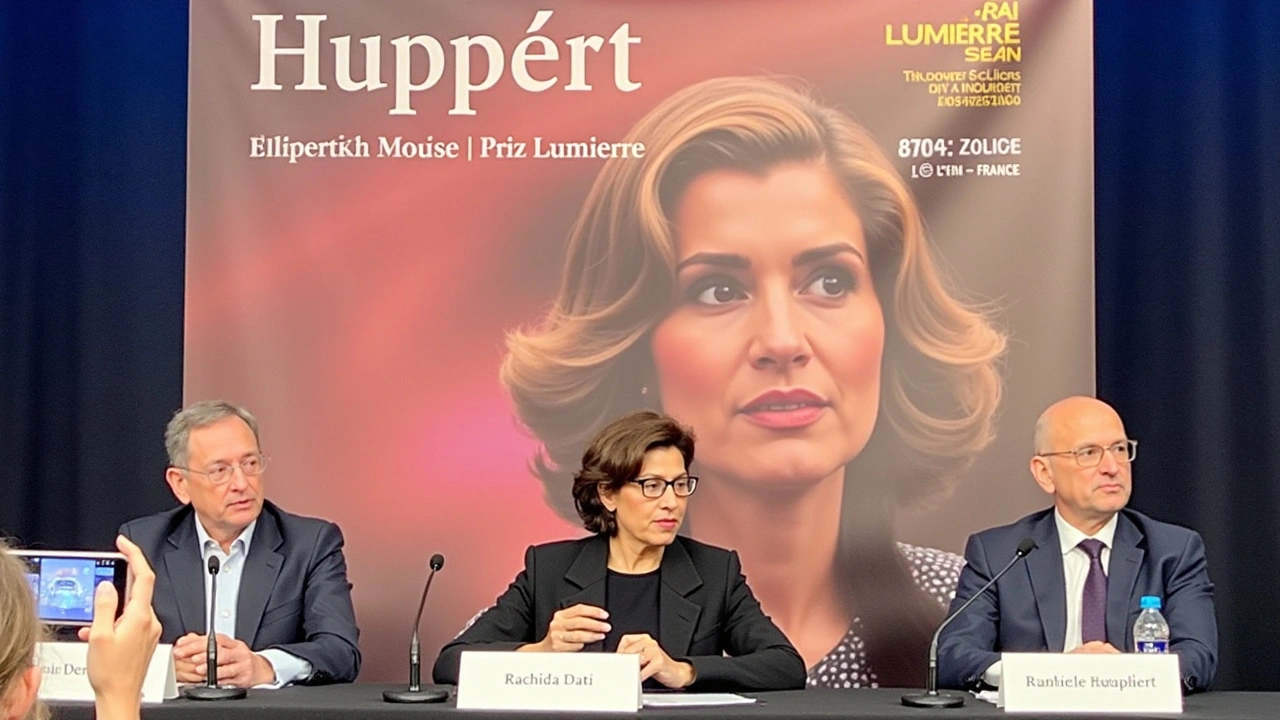France Bolsters Film Restoration: Costa-Gavras Drives 'Napoleon' Revival
 Oct, 20 2024
Oct, 20 2024
France's Commitment to Cinematic Heritage
In an era where digital cinematography dominates the world stage, France is making a bold statement about the value of its rich film history. The country has notably increased funding to facilitate the restoration of classic films, a move that underscores the enduring significance of traditional cinematic art. This financial boost is not just a superficial nod to nostalgia but an active effort to ensure that the innovative storytelling and groundbreaking techniques of notable filmmakers remain accessible to future generations.
Costa-Gavras and the Revival of 'Napoleon'
At the forefront of this initiative is the acclaimed director Costa-Gavras, who currently presides over the Cinémathèque Française. He has been pivotal in breathing life back into the iconic 1927 film 'Napoleon,' directed by Abel Gance. The film is celebrated for its pioneering techniques in cinematography and ambitious narrative scope, making its restoration a monumental task. Gance’s vision was ahead of its time, utilizing unconventional filming methods such as hand-held cameras and overlapping images.
The Herculean Task of Restoration
The restoration effort, launched in 2017, was spearheaded by Georges Mourier, a researcher and director with a personal connection to Gance. Mourier's dedication involved tracking down and piecing together original film reels and remaining true to Gance’s script. This labor-intensive process reflects the broader challenges faced by film restoration experts, who often have to work with fragmented materials amid the ever-present threat of deterioration over time.
A Landmark Screening at Cannes
The fruits of these efforts were spectacularly unveiled at the Cannes Film Festival in May 2024. It was a historic moment, as the film was screened in its complete form for the first time since its original release, accompanied by an impressive live symphonic performance involving over 250 musicians. This modern presentation of a classic piece captivated audiences, reaffirming the film's stature and the meticulous artistry involved in its revival.
Beyond Historical Films: A Broad Commitment
Restoration is just one facet of France’s efforts to position itself as the guardian of cinematic history. The Cinémathèque Française is also staging numerous exhibitions, such as the one showcasing the works of James Cameron, which highlight a diverse range of cinematic achievements. This diversity speaks to the Cinémathèque's vision of celebrating the multifaceted nature of cinema — from classic endeavors to contemporary masterpieces — with equal fervor.
The Importance of Preserving Cultural Wealth
This renewed focus on film restoration extends beyond nostalgia. It's an initiative that enriches cultural heritage, offering insight into past societies and their storytelling methods. Crucially, film restoration allows contemporary viewers to appreciate the artistry and craftsmanship of early filmmakers, bridging a historical gap and enhancing their understanding of cinematic evolution.
France's Blueprint for Global Film Restoration
By increasing funding for such projects, the French government exemplifies a commitment that many hope will encourage similar efforts worldwide. Restoration projects serve as both artistic and cultural endeavors, shedding light on the past while informing current and future film industry standards. France's approach sets a template for how countries might harness both private and public support to preserve their own cinematic legacies.

Why This Matters
The reemergence of masterpieces like 'Napoleon' reminds us of cinema’s potential to transcend time, touching upon universal themes and emotions. In protecting its cinematic milestones, France not only celebrates its historical identity but also reinforces the global nature of film as an art form. This mirrors a broader cultural appreciation that all nations would do well to emulate, ensuring that their own stories aren’t forgotten under the dust and detritus of an ever-racing progress.

Lemuel Belleza
October 20, 2024 AT 20:06France’s money dump on old movies feels more like a vanity project than a cultural rescue.
faye ambit
October 20, 2024 AT 21:46The initiative to restore Gance’s "Napoleon" does more than preserve a relic; it invites us to reconsider the roots of cinematic language. By funding such painstaking work, France signals that the dialogue between past and present remains vital. The complexities of early film techniques-hand‑held shots, overlapping images-mirror the layered narratives we still explore today. Restoring these frames offers scholars a live classroom, a tangible archive of experimentation. Moreover, presenting the film with a live orchestra bridges the auditory expectations of modern audiences with the original intent. In this sense, the effort becomes a conduit for both education and aesthetic appreciation.
Subhash Choudhary
October 20, 2024 AT 22:36Totally agree that the restoration is a big deal. It’s wild how much work goes into piecing together old reels. The live symphony at Cannes must’ve been a sight. Props to the team for keeping this part of film history alive.
Ethan Smith
October 20, 2024 AT 23:59The financial boost shows a commendable commitment to cultural stewardship. While digital cinema dominates, preserving analog masterpieces maintains a diverse artistic ecosystem. The collaborative effort between the Cinémathèque and scholars underscores interdisciplinary value. Moreover, showcasing the restored version at Cannes amplifies global awareness. Such projects can inspire other nations to allocate resources for their own cinematic archives.
Evelyn Monroig
October 21, 2024 AT 01:06All this ‘heritage’ talk is just the government hiding its real agenda.
Gerald Hornsby
October 21, 2024 AT 01:39Ah, the grand conspiracies never cease! 🎭 But seriously, art deserves preservation, even if some see hidden motives.
Hina Tiwari
October 21, 2024 AT 03:19I think it’s amazing how they’re bringing back a film from 1927. The dedication of the restorers is truly inspiring. It’s not just about nostalgia, it’s about keeping a piece of our collective story alive. The symphonic accompaniment adds a whole new layer of emotion. I hope more countries follow suit and invest in their own film archives. It feels like a bridge between generations, and that’s something we all need.
WILL WILLIAMS
October 21, 2024 AT 04:43Wow, what a vibrant revival! The colors of history are shining brighter than ever.
Barry Hall
October 21, 2024 AT 05:33Love seeing classic cinema get the love it deserves 😊
abi rama
October 21, 2024 AT 06:39Seeing "Napoleon" restored feels like opening a time capsule of imagination. It reminds us that cinematic breakthroughs aren’t new-they’ve been happening for a century. The persistence of filmmakers like Gance proves that daring vision never ages. When we watch such restored works, we inherit not just a story but a method of storytelling. This effort reinforces why cultural preservation matters for future creators.
Megan Riley
October 21, 2024 AT 07:13Absolutely, the dedication here is profound; it shows how art can transcend time!!! Restoring a film is not just about frames, it’s about resurrecting a whole era!!! The symphonic live‑performance adds a layer of emotional depth that modern digital remasters often miss!!! Keep supporting these endeavors; they are the backbone of our cultural memory!!!
Lester Focke
October 21, 2024 AT 08:36From an aesthetic standpoint, France’s investment in restoring "Napoleon" exemplifies a commendable dedication to the preservation of auteurial heritage. The methodological rigor applied by restoration experts reflects a profound respect for historical authenticity, an attribute often lacking in contemporary cinematic practices. Moreover, the integration of a live orchestra at Cannes constitutes an eloquent homage to the original viewing experience, thereby enriching the interpretive possibilities for modern audiences. Such a holistic approach, synthesizing technical restoration with performative reverence, should serve as a benchmark for international cultural policy. It underscores the notion that cinema, as an art form, warrants the same scholarly and fiscal attention afforded to literature or visual arts. In sum, this project not only salvages a seminal work but also reasserts the imperative of safeguarding artistic lineage for posterity.
Naveen Kumar Lokanatha
October 21, 2024 AT 09:43The collaborative nature of this restoration is truly inspiring it brings together historians technicians and musicians alike The effort showcases how interdisciplinary work can revive a cultural gem It also highlights the importance of government support in sustaining such projects In a world rushing towards digital everything we need anchors like this to remind us of our roots
Alastair Moreton
October 21, 2024 AT 10:33Honestly, the hype around old films can be overblown, but this one’s a legit masterpiece. The restoration quality looks spot‑on, and the live music gives it a fresh vibe. Props to the team for pulling it off without turning it into a pretentious museum piece.
Surya Shrestha
October 21, 2024 AT 12:13The resurgence of "Napoleon" under the aegis of the Cinémathèque Française serves as a profound testament to the enduring relevance of early cinematic endeavors; it is an act that reverberates beyond mere nostalgia, positioning the film as a pedagogical cornerstone for contemporary scholars and enthusiasts alike. By meticulously reconstituting Gance’s ambitious vision, the restoration team not only salvages fragmented celluloid but also reanimates the pioneering techniques that prefigured modern cinematic language-techniques such as polyvision, rapid montage, and expressive camera mobility that were revolutionary for their epoch. Moreover, the decision to accompany the screening with a live symphonic ensemble of over two hundred musicians is an artistic stratagem that bridges auditory authenticity with visual fidelity, thereby recreating a multisensory experience reminiscent of early 20th‑century exhibition practices. This confluence of visual restoration and live performance underscores a holistic approach to heritage preservation, one that acknowledges the inseparability of image and sound in the cinematic canon. The financial allocation by the French government further reinforces the notion that cultural patrimony warrants sustained public investment, an ethos that could inspire parallel initiatives on an international scale. In addition, the restoration amplifies discourse surrounding the sociopolitical narratives embedded within the film, prompting contemporary audiences to interrogate the historical representation of empire, identity, and power. Such critical engagement is indispensable for a nuanced appreciation of the artwork’s layered meanings. The project also exemplifies the collaborative synergy between archivists, historians, technologists, and musicians, illustrating the interdisciplinary nature of modern restoration endeavors. Their collective expertise ensures that the restored product adheres to both aesthetic integrity and historical accuracy, avoiding the pitfalls of over‑digitalization that can sterilize original textures. As a result, the screening at Cannes did not merely showcase a revived artifact but inaugurated a dialogue between past and present cinematic practices, enriching the cultural tapestry of the festival itself. Ultimately, this restoration stands as a beacon, illuminating the path for other nations to recognize and invest in their cinematic legacies, thereby safeguarding the diverse narratives that constitute global film history.